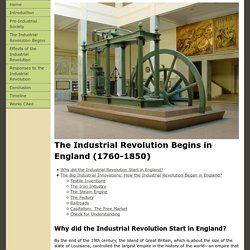

Industrial Revolution. Industrial Revolution in Britain. Untitled Document. Why did the Industrial Revolution Start in England?

By the end of the 19th century, the island of Great Britain, which is about the size of the state of Louisiana, controlled the largest empire in the history of the world—an empire that covered one quarter of the world’s land mass. You will learn more about this empire in the next chapter. But how did this little island come to rule an empire? The Industrial Revolution and the changing face of Britain. An exhibition at the Barber Institute of Fine Arts (2008-9) During the late 18th and early 19th centuries, Britain experienced change in all aspects of life, as a result of the Industrial Revolution.

Scientific advances and technological innovations brought growth in agricultural and industrial production, economic expansion and changes in living conditions, while at the same time there was a new sense of national identity and civic pride. The most dramatic changes were witnessed in rural areas, where the provincial landscape often became urban and industrialized following advances in agriculture, industry and shipping. Wealth accumulated in the regions and there was soon a need for country banking.
These themes were explored in the temporary exhibition The Industrial Revolution and the Changing Face of Britain at the Barber Institute of Fine Arts in 2008–9, and are summarized in this essay. KS3 Bitesize History - The Industrial Revolution : Revision, Page 2. Industrial Revolution - Facts & Summary. The textile industry, in particular, was transformed by industrialization.

Before mechanization and factories, textiles were made mainly in people’s homes (giving rise to the term cottage industry), with merchants often providing the raw materials and basic equipment, and then picking up the finished product. Workers set their own schedules under this system, which proved difficult for merchants to regulate and resulted in numerous inefficiencies. In the 1700s, a series of innovations led to ever-increasing productivity, while requiring less human energy. For example, around 1764, Englishman James Hargreaves (1722-1778) invented the spinning jenny (“jenny” was an early abbreviation of the word “engine”), a machine that enabled an individual to produce multiple spools of threads simultaneously.
By the time of Hargreaves’ death, there were over 20,000 spinning jennys in use across Britain.